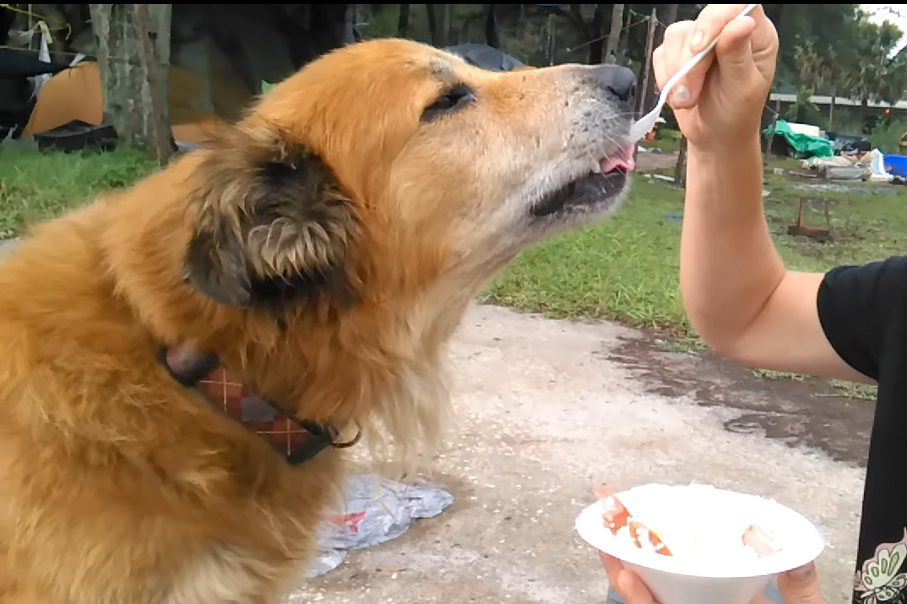New dog owners and parents are always wondering what they can feed their new dogs and what they can’t. Grits are a lovely, tasty side dish that can be served with meat or as an appetizer.
It’s a question that has plagued dog owners for years – can dogs eat grits?
Well, the answer may surprise you. According to recent statistics, over 68% of dog owners said their dog has eaten grits at least once. And while some people may be wary of giving this Southern staple to their furry friend, there are plenty of reasons why you should consider it.
Grits are a great source of fiber and protein, and they’re relatively low in fat. Plus, they’re easy to digest and won’t upset your dog’s stomach. So if you’re looking for a healthy and delicious way to treat your pup, look no further than grits!
Dogs, too, may enjoy this delicious side dish, but there are several things to keep in mind before feeding it to your dog.
First, a Dog owner should look out if their dog has a corn allergy.
What are Dog Grits?
Grits are a type of cornmeal that is made from ground corn. It has a slightly gritty texture and a nutty flavor.
They are often served with shrimp, chicken, or sausage.
Grits can also be filled with cheese, butter, or gravy. Grits are a popular breakfast food in the southern United States, but they can be eaten at any time.
Unfortunately, grits are made from corn, which may be problematic for your dog to digest in bulk.
Corn may be harmful to your dog. Some canines are allergic, so don’t give him too many grits.
Can Dogs Eat Corn Grits?
Corn grits are safe for dogs if they’re eaten in moderation. Grits can be a great way to add variety and interest to your pup’s diet.
Grains are one of the simplest things for dogs to digest, so they should not refuse to have them because it is not like their typical dry kibble supper croutons (but don’t give anything too hot to your dog).
It would be best if you started with small amounts before going all out on grit slurry time after time, though – they need to get used to new textures gradually or else risk having an upset stomach.
Dog owners should know that grit is not harmful to dogs in the short term, but vast amounts of grits can harm their gut health.
However, it’s essential to keep corn allergies at bay because even a tiny amount of this ingredient can trigger an adverse reaction and send your pup running away from the table!
Can Dogs Eat Cooked Grits?
When you feed your dog cooked grits, make sure not to add anything. If it is a once-in-awhile thing or had some before with no ill effect, this may be safe for them to eat, but give them in small amounts only.
Dogs eat plain grits cooked thoroughly, but we will not recommend instant grits or hominy grits.
If your pup loves them, cook plain grits without any added spices because they might be toxic for your furry bud.
However, if you overfeed him carbohydrates, it may develop weight gain and numerous health issues in dogs!
Can Dogs Eat Grits And Eggs?
Eggs are a safe, nutritious treat for your dog. They contain essential amino acids and high-quality protein that can make them happy in more ways than one!
You can make a delicious treat with lots of eggs and a tiny amount of grits for your dog on special occasions. It is a lot safer.
Can Dogs Eat Yellow Grits?
No, they are not recommended for you, bud. Yellow grits are the perfect ingredient for making your dog fat and unhealthy.
They’re made from milled yellow corn, which means it’s not only empty calories but also provides absolutely nothing in terms of nutrition!
There’s a reason why it’s called “grits.” Eat too many of them, and they’ll pack on weight without providing any required nutrients, leading to heart disease or diabetes.
Can Dogs Eat Dry Grits?

Dogs should not eat dry grits because it will make their stomachs work harder to digest the food and cause digestive problems.
Dry Grit itself is not harmful, but giving your dog, this diet will make it take longer for the food to digest as they might need more water, which causes unnecessary suffering and an increased chance of obesity or diabetes.
So don’t let your pup have an uncooked bowlful – give them some extra fluid before feeding these nutritious ingredients.
Can Dogs Eat Buttered grits?
Butter isn’t the best option for your pup. Too much can lead to heart-related diseases. A small amount is safe, but if you feed them with this type of saturated fat doesn’t offer any nutritional benefits to your pup’s health.
Can Dogs Eat Cheese Grits?
Grits are a popular carbohydrate for dogs. Cheese grits, in particular, can be good because it has protein and calcium, but some people find that their dog is lactose intolerant, so you should test before giving them any cheese-based dishes made with milk.
Can Dogs Eat Sugar Grits?
Giving your dog sugar grits can lead to weight gain and complications with their blood sugar levels. So you shouldn’t give them any, so we recommend avoiding this at all costs!
Can Dogs Eat Grits Peppered Grits?
Seasoning your dog bowl of grits with peppers could be toxic for your dog. Peppered grits are not recommended as they can cause an upset stomach.
Are Seasoned or Flavored Grits for Dogs Safe?
Toppings, flavoring, or seasoning your dog food could be lethal for them because it messes with their taste buds and could result in liver or kidney damage! Unseasoned or plain grits are the way to go for the added nutritional value.
A dog’s digestion depends on simple foods. Hence, it always pays off if we can avoid adding anything else into their food dish- primarily since these items have been known as downright harmful towards canine health in one way another, causing them a lot of gut health issues.
Health Benefits of Grits For Dog
Grit is a great way to get your dog some much-needed protein, carbohydrate, folate, and amino acids. It can help them feel healthier!
Grits high in fiber and containing B vitamins can be a healthy treat for dogs. However, it would be best to speak with your veterinarian before feeding grit as an occasional snack because it is not part of the regular diet but rather something you want to use now and then.
Grits are not only an excellent source of fiber, but they also provide many essential nutrients that would otherwise be lacking in your pup’s diet. Therefore, they should never replace dog food as the main component of their eating routine.
You can use grits as supplements as they contain enough protein, sodium, or calcium for healthy development and growth (although adding grit may make them eat more).
Grits are a great source of sodium, and they also contain nine percent naturally occurring in the form of salt that is not so good for your dog’s gut. The main ingredient for grits comes from corn kernels, so it’s not just about taste but rather nutrition too!
Final Thoughts
There are many ways to serve grits, so as a good and responsible dog parent, look at the safest ones for sharing with your pup.
Grits are a staple in Southern cuisine, and now they can be enjoyed by both humans and dogs alike. However, before giving your pup this tasty side dish, keep some things in mind.
First of all, grits may not be the safest for dogs with sensitive stomachs or allergies; it’s best to consult your veterinarian if you have any questions about potential adverse effects on your pet.
Secondly, while most people eat their grits plain as a side dish or breakfast food, dog owners should beware that adding salt to these grains could lead to dehydration because of their high sodium content.
So tell me, have you ever given your dog grits before? If so, what was their reaction? Did they love it, or did they turn their nose up at it? Do you think that grits are a good food to give your dog as a regular meal? Let me know in the comments below!





